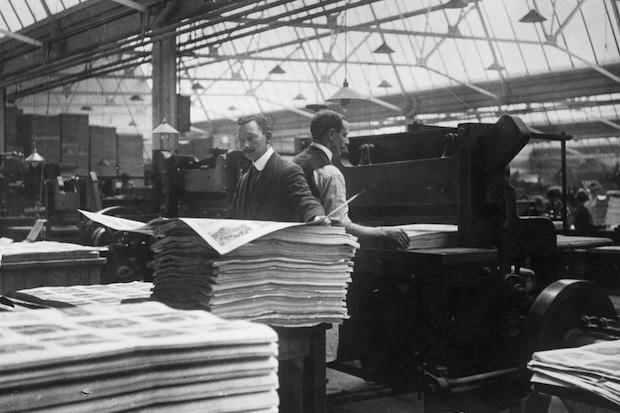From ‘Longs and Shorts’, The Spectator, 12 June 1915:
Names of things in constant use should never be too long. The cinematograph has inevitably dwindled into the “cinema,” while young America calls these shows the “movies.” But the passion for polysyllables, though considerably abated, has not died out of the Press. (How could it, when so much work is paid for by length?) Not so many years ago Mr. Punch’s famous advice to those about to marry was referred to in a leading daily as “the memorable monosyllabic monition of the Democritus of Fleet Street.”
The world would be much drearier if journalism were shorn of these decorations, and refused to conciliate those minds which find magic and consolation in “that blessed word Mesopotamia.” Authors like Matthew Arnold, for example, may boldly repeat words and phrases, much as a composer employs a leading motive; but the essence of journalism, as practised by some of its most illustrious representatives, is paraphrase, or at least the avoidance of repetition. Thus, if you have alluded to Bacchus in one sentence, and desire to allude to him in the next or the next but one, you must not say Bacchus tout court, but “that classic deity traditionally associated with indulgence in spirituous liquors.” There is a story of a leader-writer on the same paper who quoted the saying, “To the pure all things are pure,” and was promptly hauled over the coals by the editor. “You can’t say ‘to the pure all things are pure’; ‘innocuous’ or ‘harmless’ perhaps, but not pure.” The leader-writer gently explained that it was not his own phrase, but a quotation from St. Paul, whereon the editor retorted: “Well, all I can say is that St. Paul would never have written for the Daily Semaphore.”
Even Wordsworth dodged the use of the word “tea” by describing it as “China’s fragrant herb.” Perhaps the best example of picturesque periphrasis, however, with which we are acquainted appeared in a provincial Irish newspaper. The writer was describing the coming-of-age festivities held in honour of the son of a local landlord. Dancing formed part of the entertainment, and the fiddler was referred to as “Paganini’s representative.” Not quite so good, but still excellent of its kind, was the phrase “the unfortunate Brabantian nobleman,” coined by a London musical critics to describe Telramund in Lohengrin. To discuss modern journalism without reference to America would be an un- pardonable omission.
The American newspaper Press is far more varied than ours. There are daily and weekly American papers which for sheer ability, sanity, and accuracy of information equal, if they do not eclipse, anything of the sort that is published in the English language. There are also American newspapers which in their disregard for the privacy of the individual exceed the worst offences of our yellow Press. And so is it again in respect of the rival modes of expression—the concise and the prolix.
America is the land of quick lunches—and of orations. The style of speaking is more full-blooded, florid, and orotund than ours. Lincoln, it is true, was never diffuse, and in his great moments his words, as it has been said, seemed to burn with the heat of their compression. But Lincoln was unique. The worship of mammoth dimensions, to which one of their own writers gave the name of “Jumbomania,” is reflected in American newspapers as well as in their skyscrapers. Their talk, like their buildings, is tall, though nowhere are these excesses more sternly eschewed or more severely castigated than in the best American papers. Yet while Americans have contributed many dubious coinages to the journalistic vocabulary, it would be ungenerous not to admit that they have enriched it by many terse, vivid, and indispensable additions. If we owe them, as we believe we do, such monstrosities as “mentality,” we are also indebted to them for ” boom ” and “slump” and ” boss ” and many other irresistible monosyllables.






Comments